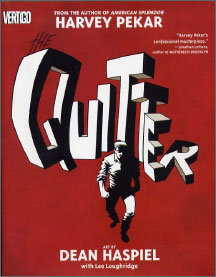 |
 Harvey Pekar
Harvey Pekar
The Quitter
Reviewed by: Rick Kleffel © 2006
Art by Dean Haspiel with Lee Loughridge
Vertigo / DC Comics
US Hardcover First Edition
ISBN 1-401-20399-X
Publication Date: 10-05-2005
105 Pages; $19.99
Date Reviewed: 04-19-06
Index:
General Fiction
Non-Fiction
Readers who approach the world of comics can be stymied and put off by the episodic nature of the medium. If you are used to sinking into a big fat novel, the stop-and-start journey through a collection of comic strips, even if they involve one character, can be a bit jarring. Harvey Pekar is, to be sure, a master of traffic jam comic non-fiction. His vignettes of everyday life are pitch perfect, funny and get under your skin. Until now, I've not seen a longer work from this talented writer. But when artist Dead Haspiel helped Pekar hook up with the directors and producers of film American Splendor, he extracted a promise from Pekar. Haspiel wanted Pekar to write something longer, and Haspiel wanted to illustrate it.
'The Quitter' is, in a sense, Pekar's first graphic novel, though it's non-fiction. As illustrated by Dean Haspiel, it's a brooding piece of film noir about Pekar's youth of street fighting and deep-seated insecurity, tempered by jazz music and literature. It's a poignant and original tale of classic can't-do Americana.
Since Pekar's spent the last thirty-something years telling the story of his last thirty something years, when Haspiel asked for a story, Pekar ratcheted back to his childhood. Pekar's parents were Polish immigrants who came to Cleveland in the 1920's. In a classic American Dream sequence they start working at, then manage to buy, a small neighborhood grocery store. Of course, the classic American dream is a bit more hardscrabble than the movies would have you believe. Haspiel's muscular art highlights the shadows and sharp edges that made a strong but not necessarily comfortable setting for young Harvey.
Harvey Pekar accepts the accolades after kicking some kid's ass.
As Pekar's story unfolds, readers for the first time get a glimpse of the child who was the father of a man we know so very well. Harvey was a perfectionist who, if he considered his own efforts less than perfect, simply quit rather than let himself finish in second place. Haspiel presents Harvey's dilemmas in powerful split-screen shots. He renders Pekar's world in shades of black and grey, and shows a young man growing up in Cleveland with the strength and vigor one might associate with a violent noir detective. Of course, Pekar himself was no shrinking violet, even if he was a quitter. He made a name for himself in school as a street fighter. With that background, it comes as no surprise he went straight into the Navy out of high school.
What does come as a surprise is his high-strung reaction to his inability to wash his own clothes by hand while in boot camp. He freaks out, bails out, tries again, fails again, and fails better. Yes, there is more than an echo of Beckett in Pekar's travails, especially as illustrated by Haspiel. This is a fantastic partnership for storytelling. The combination of Pekar's laconic prose and Haspiel's iconic illustrations is like a one-two knockout punch thrown by Pekar in the back alleys of Cleveland.
But there's more than grit and grime here, or else we wouldn’t be reading this book. Pekar discovers jazz music and Henry Miller, a potent combination. He befriends a jazz critic who helps him get his jazz criticism published. He meets Robert Crumb, and we zoom forward to Sundance and a prize for the American Splendor movie. The charm of this novel is that Pekar uses the comic medium to great advantage, inserting his older self in the action as his younger self gets the stuffing pounded out of him, or pounds the stuffing out of some unfortunate opponent.
Even at a mere 105 pages, 'The Quitter' has the heft of a full novel, only it is admittedly a lot faster, more fun and easier to read. Pekar demonstrates here that he has the ability to tell a long, complex story, with Haspiel as an outstanding artistic collaborator. DC Vertigo gives readers a glossy keeper, beautifully printed and bound. 'The Quitter' is the kind of comic book that can utterly transform your notion of what a comic book can be and do. Pekar's been at this for more than thirty years. We can only be grateful that he didn't live up to the name he gives himself.
|
 |
